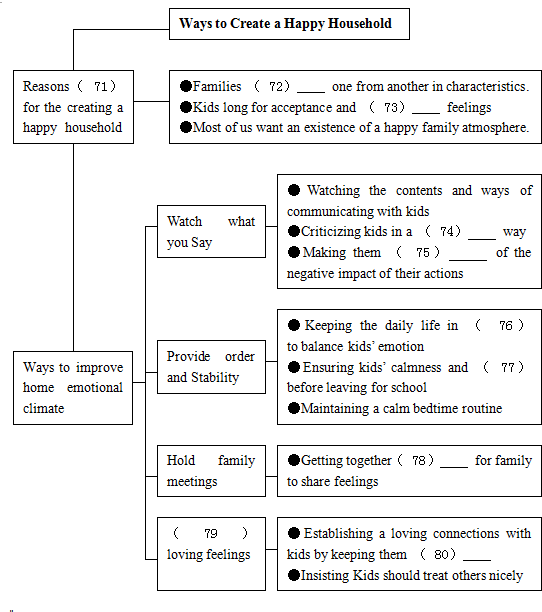15.Ways to Create a Happy Household
Every family is different,with different personalities,customs,and ways of thinking,talking,and connecting to one another.There is no one"right"kind of family.But whether parents are strict or tolerant,irritable or calm,home has to be a place of love,encouragement,and acceptance of their feelings and individuality for kids to feel emotionally safe and secure.It also has to be a source of don'ts and limits.Most of us want such an atmosphere to exist in our homes,but with today's stresses this often seems harder and harder to achieve.From time to time it helps to take stock and think about the changes we could make to improve our home emotional climate.Here are a few that will.
How we talk to our children every day is part of the emotional atmosphere we weave.Besides giving them opportunities to be open about how they feel,we have to watch what we say and how we say it.
We often forget how much kids take parental criticisms to heart and how much these affect their feelings about themselves.Psychologist Martin Seligman found that when parents consistently blame kids in exaggerated ways,children feel overly guilty and ashamed and withdraw emotionally.Look at the difference between"Roger,this room is always a pigsty!You are such a boy!"and"Roger,your room is a mess today!Before you go out to play,it has to be picked up."
One way tells Roger he can never do anything right.The other tells him exactly what to do to fix things so he can be back in his mom's good graces and doesn't suggest he has a permanent character flaw.For criticism to be constructive for children,we have to cite causes that are specific and temporary.
Another constructive way to criticize children is to remind them of the impact their actions have on us.This promotes empathy rather than resentment.
A predictable daily framework,clear and consistent rules,and an organized house make kids--and parents--more relaxed and comfortable,and that means everyone has emotional balance.When conflicts,tensions,or crises occur,the routine is a reassuring and familiar support,a reliable harbor of our lives that won't change.
Think about your mornings.Do your kids go off to school feeling calm and confident?Or are they upset and ill-tempered?
What about evenings and bedtime?Do you have angry fights over homework or how much TV children can watch?A calm bedtime routine is one good medicine for the dark fears that surface when kids are alone in bed with the lights turned out.
Yet a routine that's too inflexible doesn't make room for kids'individual temperaments(气质),preferences,and characters.
Time together is at such a precious in most households that many families,like the Martins,hold regular family meetings so everyone can air and resolve the week's worries as well as share the good things that happened.
When the Martins gather on Friday night,they also take the opportunity to anticipate what's scheduled for the week ahead.That way they eliminate (mostly!) those last-minute anxieties over whether someone has soccer shoes for the first practice,the books for a report,or a ride to a music lesson.
Everyday life is full of opportunities to establish loving connections with our kids.Researchers have found that parents who spend time playing,joking with,and sharing their own thoughts and feelings with their kids have children who are more friendly,generous,and loving.
After all,giving love fosters love,and what convinces our kids that we love them more than our willingness to spend time with them?Many parents say that often they feel most in tune emotionally with their kids when they just hang out together--sprawling on the bed to watch TV,walking down the block together to mail a letter,talking on long car rides when kids know they have a parent's complete attention.At these times the hurt feelings and the secret fears are finally mentioned.
Part of encouraging loving feelings is insisting that kids treat others,including siblings,with kindness,respect,and fairness--at least some of the time.In one family,kids write on a chart in the kitchen at the end of each day the name of someone who did something nice for them.

71.accounting72.distinguish/tell/differentiate/discriminate73.safety/security74.constructive75.aware/conscious/know76.order77.(self-)confidence78.regularly79.Encourage80.accompanied/company81./.

